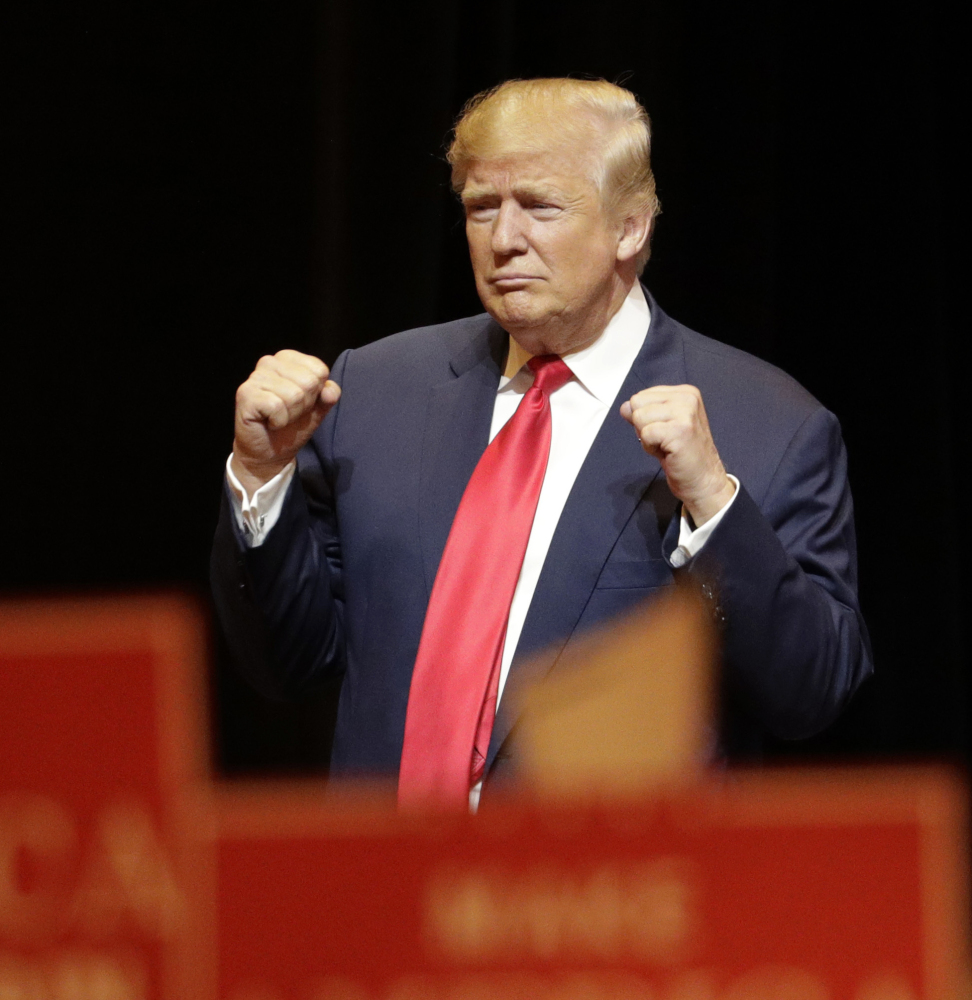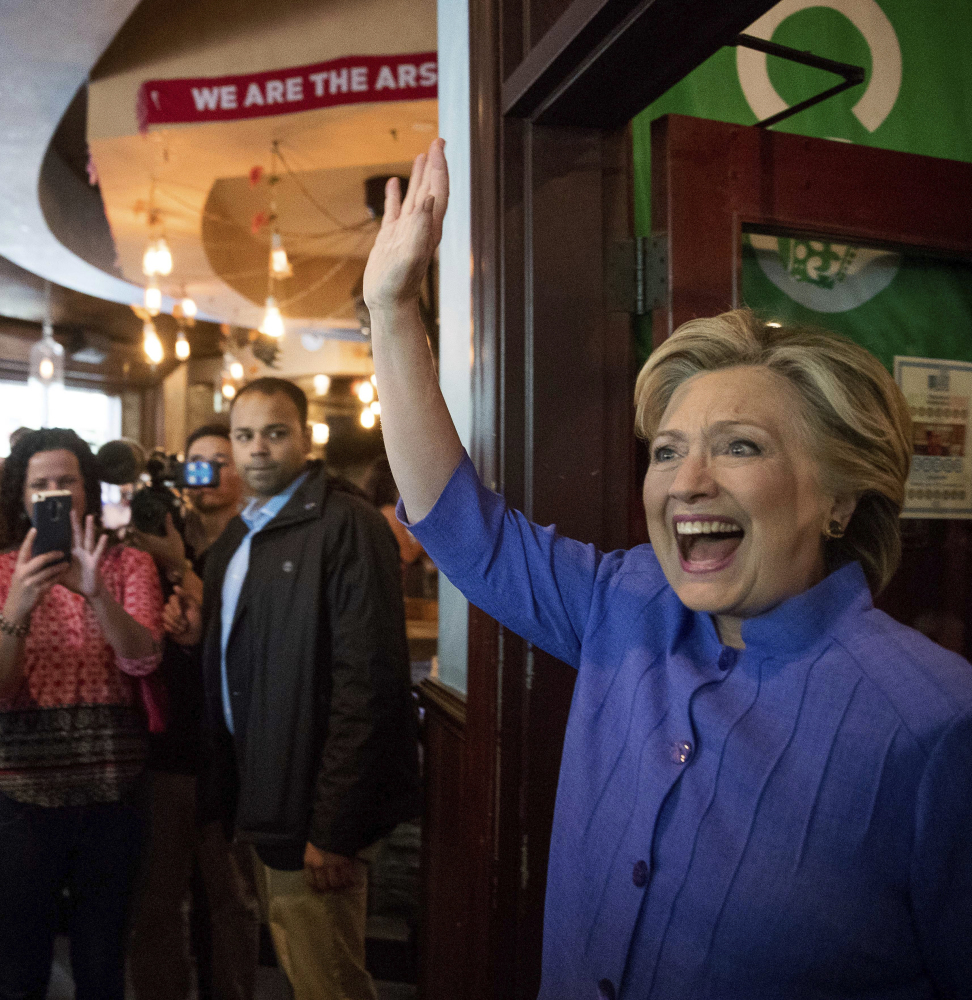Republican presidential nominee Donald Trump is redirecting his attention to traditionally Democratic states in the final days of the 2016 campaign in an urgent attempt to expand what for weeks has been an increasingly narrow path to victory.
Following FBI Director James Comey’s surprise announcement Friday that the agency would once again examine emails related to Hillary Clinton’s time as secretary of state, Trump and his advisers see a fresh opportunity to make gains in states that most public polls have shown as out of reach. They spent the weekend deliberating ways to seize on what they see as a dramatic turn in the campaign’s closing chapter and scramble the political map after a rough stretch beset by controversy.
Trump rallied Sunday in Colorado and New Mexico, and he was scheduled to make two stops Monday in Michigan – and visit Wisconsin the day after that.
Clinton, meanwhile, is focused on shoring up turnout and enthusiasm, particularly among minority voters, in critical battlegrounds such as North Carolina, Florida and Ohio. Early voting data from Ohio contains ominous signs of a lack of enthusiasm for Clinton, notably in places such as Cleveland’s Cuyahoga County, where high black turnout propelled President Obama to victory in 2008 and 2012.
As a result, Clinton’s campaign has launched an intensive effort to send her most popular surrogates, including the president, first lady Michelle Obama and rapper Jay Z, across the country.
Clinton’s operation has also come out forcefully against what aides described as Comey’s “unprecedented” decision to release a “vague” and “misleading” letter. One senior aide said the campaign does not believe Comey’s actions have measurably changed the state of the race.
TRUMP FACES CHALLENGES
Trump’s sudden blue-state push faces steep challenges both organizationally and demographically. In several of the states in question, millions of early votes have already been cast, and polling shows that the planned shift faces hurdles.
Nationally, the contest is tightening in tracking surveys to within the margin of error, but Trump remains behind by mid-to-high single digits – much as Mitt Romney was four years ago – in the states he is hoping to turn into unusual final-week fronts.
According to the latest Washington Post-ABC poll, a majority of all likely voters is unmoved by Comey’s decision, which has spurred a fierce backlash from Clinton backers.
Trump campaign chief executive Stephen K. Bannon has settled on three states in particular – Michigan, Wisconsin and New Mexico – where the candidate and campaign will devote more time and money, said four people familiar with the discussions. All three states were won by Obama in 2008 and 2012.
Bannon believes that if Republican voters rapidly “come home” nationally in light of recent events, that turnout plus late-breaking support among independents and blue-collar workers could bring new states into play beyond Pennsylvania, Nevada and Colorado – Democratic strongholds where Trump has been campaigning for months and remains behind.
Democrats and many Republicans remain skeptical that Trump can reach 270 electoral votes with this 11th-hour ploy or any other. But Trump strategists argued Sunday that the race’s fast-changing dynamics and unpredictability give them an opening despite polling and fundamentals leaning in Clinton’s favor.
These advisers privately described Trump’s path to the White House not as a direct shot but as a series of razor-thin upsets in several much-discussed battlegrounds, as well as unexpected bank shots in blue states. All of it would depend on better-than-expected Republican support nationally, they said.
CLINTON CAMPAIGN CONCERNED
For Clinton, the focus has been on stoking enthusiasm and turnout in places where Democrats are confident about their campaign infrastructure but concerned that some Democratic voters, particularity minorities, may choose to stay home.
As Trump makes moves into Michigan and Wisconsin, the Clinton campaign and its allies are dubious about whether the Trump campaign will actually be able to move numbers there or ramp up their organization. But they are trying to energize voters in cities, including Detroit and Milwaukee, where her success could depend on a robust urban turnout should Trump attract unexpected working-class support.
The Clinton campaign also recently began spending money on television in Wisconsin for the first time this year, casting the ad buy as a way of bolstering support in a state with a hard-fought Senate race.
Michigan, which Democrats have carried in presidential races since 1992, is a clear test of the strength of Democrats’ blue wall. Much of Obama’s margin came from exceptional turnout in Detroit’s Wayne County; he won it by 382,032 votes, on the strength of black and Muslim turnout that Democrats acknowledge this year is not yet at its Obama-era pace.
Clinton supporters learned nervousness in Michigan in this year’s Democratic primary, when public polls failed to catch a surge by Sen. Bernie Sanders, I-Vt. Some white pockets of the Detroit area that went to sleep on the Michigan-born Romney are visibly more active for Trump.
On Sunday at a rally in Taylor, a Detroit suburb, Clinton’s running mate, Sen. Tim Kaine of Virginia, suggested that the bombshell nature of Comey’s letter would end up helping Democratic turnout.
“It’s kind of revved up some enthusiasm, a little bit of righteous anger,” Kaine said.
Clinton is also still trying to expand her own map, making a serious play to flip Arizona, a state the campaign believes she can win.
One Democratic strategist outside of the campaign said that private polling data had begun to show a closer race before Comey’s letter, largely because of Republican voters drifting back into Trump’s fold.
With early voting already underway in most of the contested battlegrounds, Clinton has dispatched an army of surrogates to get out the vote, including pop stars Jay Z, Jennifer Lopez and Katy Perry.
On Tuesday, the president will rally in Columbus, Ohio, and Wednesday he will appear in Raleigh, North Carolina. Stops in Jacksonville, a city where African Americans make up 30 percent of the population, and south Florida, are planned, as are more events headlined by Michelle Obama.
In Nevada, Florida and Colorado – states Obama won – early and absentee turnout has been strong overall and is so far on track to match or exceed 2012 levels, according to available data.
But in Iowa and Ohio, turnout levels have been low. Take Cuyahoga County in Ohio, a Democratic stronghold, where in-person and absentee voting is down by more than 50 percent, compared with a similar period in 2012.
Send questions/comments to the editors.




Success. Please wait for the page to reload. If the page does not reload within 5 seconds, please refresh the page.
Enter your email and password to access comments.
Hi, to comment on stories you must . This profile is in addition to your subscription and website login.
Already have a commenting profile? .
Invalid username/password.
Please check your email to confirm and complete your registration.
Only subscribers are eligible to post comments. Please subscribe or login first for digital access. Here’s why.
Use the form below to reset your password. When you've submitted your account email, we will send an email with a reset code.